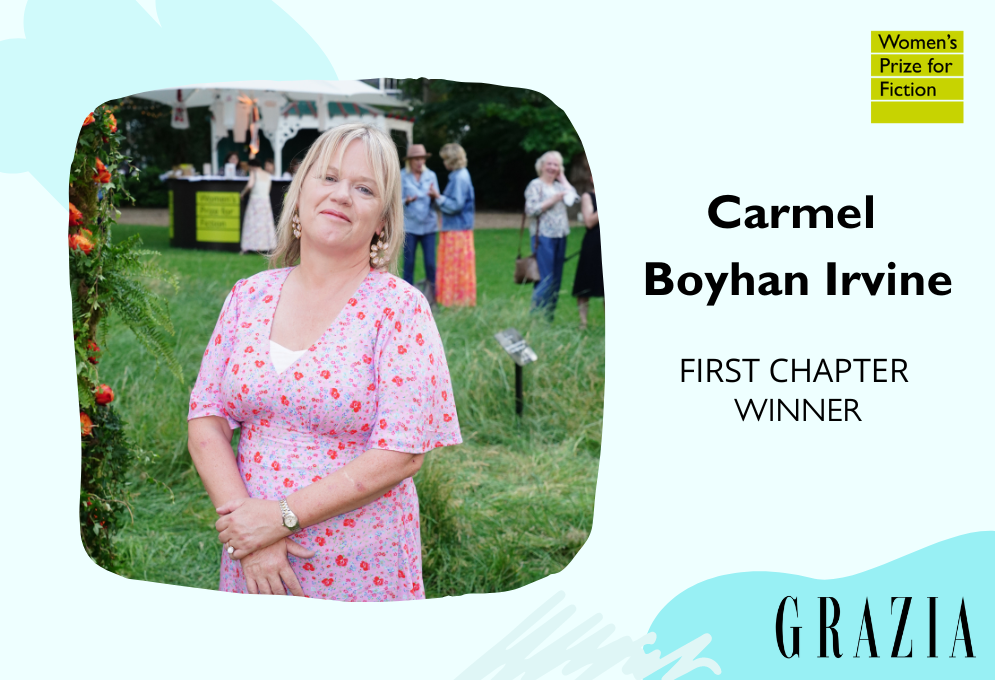

The Women’s Prize x Grazia First Chapter competition ran for 12 years and has now been discontinued, with 2022 being the last year the competition was run. We keep an archive of past winners and runners-up to inspire future writers to tell their stories. Scroll on to read the 2022 entry that stunned the judges and participating author, Tayari Jones. Feeling inspired? You can enter our Discoveries programme for emerging writers. Learn more here.
We are thrilled to announce the winner of the 12th annual Women’s Prize x Grazia First Chapter Competition. Over 600 women from across the UK were inspired to fire up their laptops and complete a chapter started by Tayari Jones, bestselling author and 2019 winner of the Women’s Prize for Fiction. This year’s competition was judged by Grazia’s deputy editor Emma Rowley and acting senior editor Maria Lally, along with author Tayari Jones.
“She pairs a poet’s attention to language with a novelist’s sense of urgency and plot – Tayari Jones”
The judges were blown away by the high standard of entries, but one writer in particular captured their imaginations. The 2022 First Chapter winner is Carmel Boyhan Irvine, a doctor and medical educator from Plymouth who specialises in inclusion medicine for underfunded communities. Carmel says: “Coming from a family of strong female role models – with seven sisters and an inspiring mother who fostered a love of literature from childhood – I am delighted to be associated, even in a small way, with the Grazia First Chapter award and affiliated to the Women’s Prize. I am particularly thrilled to have the opportunity to work with Tayari Jones, whose masterful prose and public statements serve to entertain, to inform and to advance the causes of social justice.”
As part of her prize, Carmel will now receive mentorship from Tayari Jones. On Carmel’s writing, Tayari says: “The winning entry is superb in its pacing and depth of character. In just a few paragraphs, we are able to see the effects of generational trauma, substance abuse, and good old fashioned familial strife. She pairs a poet’s attention to language with a novelist’s sense of urgency and plot. I can’t wait to read what she writes next.”
As well as a year of one-to-one mentorship, Carmel also wins an invitation to the Women’s Prize award ceremony, a set of the six Women’s Prize shortlisted books and a five-day residential course from the Arvon Foundation, where she’ll have the chance to take her writing skills to the next level. We look forward to reading more from Carmel!
Our judges also selected two finalists: Estefania Cortes Harker, 35, was raised in Madrid in a British and Spanish household. She moved to London to pursue a career in fashion design, joining the MA course at Central Saint Martins before working her way up to Design Manager at a quintessential British brand. She has been writing stories since she was a child and was recently longlisted for the Brick Lane Bookshop Short Story Prize. Read Estefania’s entry here.
Her fellow finalist is Emma Zipfel, 43, a mother and teacher, who is usually surrounded by the seemingly incongruous combination of books and (often loud) voices. Unsurprisingly, she is passionate about children’s writing and in particular, stories that reflect a diversity of voices and experiences. Read Emma’s entry here.
I’d lost my job at the start of the pandemic and there really wasn’t much to fill my afternoons, so you can’t blame me for day-drinking. Returning home for a nap, I found a tall woman sprawled inelegantly on the front stairs, surrounded by candy wrappers.
She didn’t recognize me. To be fair, I had changed a lot in the last twelve years; it’s called growing up. Still, having planned the encounter, she should have been prepared.
As I opened the gate, she smiled and asked if I knew a girl called Teresa.
“It’s me,” I sighed. “Mother, it’s me.”
She paused, mid-rise. I stood still and met her eye. In that five second gap before she looked away, a lifetime of memories raced through the dead space in my head. Her tone was an octave lower than I recalled but still had that bellicose inflection I remembered from my birthday party. “Blow out the candles with one puff, Teresa, one puff, my best girl.”
Even at the age of ten, before I knew of cognitive dissonance, of gaslighting, of the easy way a human can mean one thing and do the opposite, I recognised this for the spin it was. I was her only girl, her only child, in fact. The superlative she used as a put-down. “Be careful,” is what I heard her say. “Everything is conditional.” Blowing out the candles I made a wish that had yet to come true.
It was a shock seeing my mother again. They call it taking stock, when the earth jars on its axis. My dreams drift in a stream of diaphanous thinking, high above my spinning world. Now, memory collided with reality, to a magnitude of five on the Richter scale, not quite the upheaval of being escorted from my office – that rated a six – and certainly nothing like the blast waves extending outwards in concentric circles since Thomas had left, or rather, had not returned, but it was a blow nonetheless and, like all disturbances, it rendered what was hidden suddenly obvious. Mother is here for a reason, I realised.
It briefly occurred to me to wonder what the etiquette might be in this situation. I owned every inch of this space, at least for the moment. It remained my house, my front porch, as defined by the notary and the land register. Technically, I was the host. How do you greet a mother whom you’d last seen driving away from a children’s home which you had entered only an hour before?
I could tell that she too was grappling with a dilemma, less to do with manners, I suspected, and more to do with her frustration at the scene unfolding before her. Despite her planning, she’d been caught unawares. She must have been annoyed that she had looked less than perfect for our meeting. “First impressions, Teresa! You never get to make a second entrance!”
I admired her calculations. She had exploited the advantage of surprise and deliberately chosen to occupy the high ground of my staircase for what she hoped was an uninterrupted hour or two, the better to reconnoitre my life through the place where I lived. These were military tactics and this was surely a war.
There was no car on the driveway, mine having been removed when my licence was revoked. Alcohol dependency is so good for the planet. She must have come by taxi. The pandemic was a gift to people like my mother; with its government directives to isolate, shelter-in-place, withdraw. Of course she had shielded, not because she was clinically vulnerable but because of the state’s endorsement of the very sociopathic behaviours she had been perfecting over two generations. She would never have taken public transport.
She stood up. “Teresa,” she said, in that ambiguous way that relatives who haven’t seen one for 24 years, 2 months and 5 days seem thrown by the unnatural acceleration of time evident before them. I’ve always wondered if this surprise is an expression of delight at one’s growth or dismay at their sudden realisation of days running down to the grave.
My mother looked directly at me. “Teresa,” she said again, extending her arm in a parabolic sweep over my head, from the boundary fence to the water. “I never expected this.”
Was she referring to my detached and substantial house or my early afternoon appearance? Who expects a 34-year-old professional to be at home on a Thursday during cocktail hour? Pre-sacking, I was indeed the personification of my postcode; river views, gallery memberships, solid, unshowy success. I had read that the sound of the pebbles on one’s driveway was a signifier of one’s wealth. My oval white chippings make a faint squeaky noise underfoot. From a height, one could imagine me standing in a garden of compacted snow.
I angled my head to one side, adopting a listening pose. Five minutes earlier I’d been on the point of tipping into an afternoon of mellow anaesthesia. After three vodka martinis and a round of chasers I can assume an easy nonchalance that is sometimes mistaken for intoxication but is, in reality, a philosophical mien. An hour into drinking my thoughts become less tethered to the here-and-now and form a balloon which carries me high above the detritus of my life. The elevation affords a broad perspective. My liquor companion, Amanda, describes we two as existential addicts. We drink because we think, she likes to say, though I believe we drink because we care.
I recognised that I was in what the anthropologists term fight or figure-it-out mode. The ropes tethering my happiness held fast. My mother gave birth to me but I was raised by the state. Running was not an option.
I mounted the steps and sat down. Their broad tread was a feature of these brownstone stoops, almost wide enough to hold an outdoor table. I patted the warm smoothness. “Come and sit by me,” I said to my only mother, careful to maintain enough distance to satisfy an epidemiologist and proximity to reassure a social worker that we posed no danger to one other.
She faltered again, clearly now wondering who was the mother and who was the child. I could have told her then, at the age of ten, but that would have broken the spell.
Feeling inspired? You can find a treasure trove of writing tips from Women’s Prize judges and authors in our writer’s toolkit.
Tune into host Vick Hope and a line-up of incredible guests on our weekly podcast full of unmissable book recommendations.
